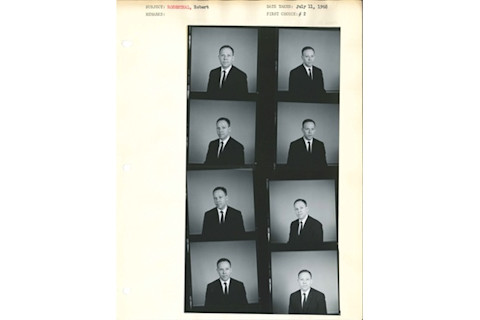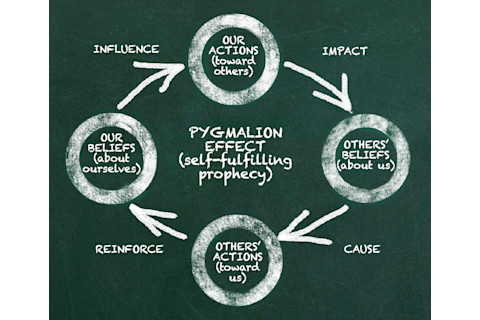Beverly Cantello didn’t appreciate being misled — at least, not at first.
It was 1964. Cantello was 23 years old and just starting out in her teaching career when a Harvard psychologist named Robert Rosenthal came to her elementary school. The principal announced that she’d given Rosenthal permission to administer a fancy-sounding new IQ test to the school’s students that spring.
Shortly thereafter, Cantello was told that Rosenthal’s Harvard Test of Inflected Acquisition revealed something remarkable: Small groups of children in each classroom were poised to “bloom” academically.
And indeed, over the next school year, the designated students at Spruce Elementary School in South San Francisco excelled, just as predicted. The youngest of them made the most dramatic gains: On average, these first-graders increased their IQ scores by more than 27 points.
Only then were Cantello and her colleagues informed that Rosenthal had not told the truth. The Test of Inflected Acquisition was just a standard IQ test. The “bloomers” had been chosen at random. It was the teachers’ belief in their pupils’ potential, not any innate advantage, that spurred the students to achieve.
“At first, I was offended. I thought, ‘How dare they?’ ” recalls Cantello, now retired, on a recent afternoon in her sunny kitchen in San Rafael, Calif. “Later I understood why he needed to fool us.”
Rosenthal struck gold with his now-famous findings. His study survived an extraordinary storm of controversy to become one of the most inspiring and widely cited breakthroughs in the history of psychology. “The bottom line is that if we expect certain behaviors from people, we treat them differently — and that treatment is likely to affect their behavior,” says the psychologist, now 82 years old and still collaborating with researchers on nonverbal communication projects at the University of California, Riverside.

In 1964, Robert Rosenthal gave an IQ test to students at the Spruce School, (shown here in the 1960s; these children may or may not have been tested). (Credit: Courtesy of the South San Francisco Historical Society)
Courtesy of the South San Francisco Historical Society
He called his discovery the Pygmalion Effect, after the mythological Greek sculptor whose love for the ivory statue of a woman he created inspired the gods to bring her to life. Similarly, the researcher’s deception gave a new lease on life to the lucky “bloomers.” Many came from low-income Mexican families, and already by first grade they had been “tracked,” according to teachers’ expectations of their future performance. At a time when most scientists still believed IQ scores were genetically determined and fixed throughout life, the faux results of the Harvard Test of Inflected Acquisition bathed these students in a new, more optimistic light.
The discovery embodied the American dream — writ small enough to fit inside a classroom — and appeared to hold the promise to transform our educational system. Any student had the potential to “bloom,” it would seem, under the right circumstances.
Half a century later, however, and to the frustration of many enthusiasts, this promise remains mostly a tantalizing possibility.
“The Pygmalion Effect is great science that is underapplied,” complains retired Tel Aviv University Professor Dov Eden, who has been a career-long Pygmalion evangelist as a management consultant and psychologist for the Israel Defense Forces. “It hasn’t made the difference it should have in the world, and that’s very disappointing.”
Eden’s frustration, shared by many other researchers who have tried to replicate Rosenthal’s stunning findings, stems from an important caveat to the apparent promise of Rosenthal’s discovery at the Spruce School. In that experiment and hundreds of similar subsequent ones, the expectations Cantello and her fellow teachers had for their students were fruitful only when their behaviors were subconsciously driven, suggesting that they might not have been able to so earnestly alter their behavior if they had known the truth about their students from the beginning. This apparent need for initial deception would certainly seem to deflate any hope that the Pygmalion Effect one day could change the way we parent our children, run schools and factories and even train our soldiers.
But Rosenthal remains optimistic. There are some very good reasons, he contends, to maintain high expectations about high expectations.
They begin with his own childhood.
Early Expectations
Well before his visit to the Spruce School, Rosenthal was the beneficiary of the kind of faith he’d later study. As the only son of German-Jewish Holocaust refugees, he was keenly aware of his parents’ ambitions for him, no matter what pursuit he enjoyed. When he played sandlot football as a child growing up in Southern Rhodesia (now Zimbabwe) — the first step in his family’s immigrant odyssey that later brought him to New York — his father encouraged him to pursue his interests, including becoming a professional football player (though he says he had nowhere near the aptitude to go pro). After his family subsequently settled in America, Rosenthal joined the U.S. Naval Reserves, prompting his father to speculate about his future career as an admiral.
Rosenthal instead pursued psychology, and true to his parents’ expectations, he soon distinguished himself. While teaching at the University of North Dakota before being hired at Harvard, he devised a mischievous project that confirmed his early suspicions about the power of expectations. He asked a group of lab researchers to experiment with rats that he said were specially bred to be either exceptionally good or exceptionally bad at running through mazes.

Robert Rosenthal (Credit: Harvard University Archives)
Harvard University Archives
In fact, there was no difference between the “maze-bright” and “maze-dull” rats, despite the labels that Rosenthal’s student accomplices had attached to the cages. But, as Rosenthal predicted, the “maze-bright” rats ran the maze faster and more accurately than the dull rats. Perhaps the rats gained an edge because of the way the keepers anticipated the rats’ behavior. Rosenthal, who was certain the experiment revealed a powerful and mostly subconscious dynamic, wrote about this discovery in a 1963 article in American Scientist. In the article, he speculated that “if rats became brighter when expected to, then it should not be farfetched to think that children could become brighter when expected to by their teachers.”
This prompted a letter from Lenore Jacobson, the Spruce School principal. “If you ever ‘graduate’ to classroom children, please let me know whether I can be of assistance,” she wrote. Rosenthal didn’t keep her waiting.
Splash and Backlash
Rosenthal and Jacobson would later collaborate on a book on their famous study — disguising the school’s location by referring to it as “the Oak School.” In the weeks leading up to the 1968 publication of the book, Pygmalion in the Classroom, Rosenthal was ballyhooed in a front-page story in The New York Times, and in an interview with Barbara Walters on the Today show.
Then came the attacks.
“Pygmalion is so defective technically that one can only regret that it ever got beyond the eyes of the original investigators!” wrote Columbia University’s Robert Thorndike, an expert in educational and psychological testing and one of several prestigious scholars who lambasted Rosenthal’s project. Thorndike, who died in 1990, charged that Rosenthal used faulty data from the first IQ test, including what Thorndike said were impossibly low initial IQ levels, which, he suggested, skewed the later results. At the time, Rosenthal countered that even if the initial test results were faulty, that didn’t invalidate the subsequent increase, as measured by the same test. Moreover, Rosenthal says, the design for the experiment Thorndike found so flawed had previously won an award from the American Psychological Association.
Some of the critics were plainly politically motivated. Albert Shanker, founder and future president of the United Federation of Teachers, rebuked the Pygmalion experiment in his regular Sunday column in The New York Times, suggesting that it vilified teachers:
“If thousands upon thousands of children are not learning to read, write, speak and compute, it is not because of overcrowded classrooms, the effects of poverty and social conditions, poorly developed educational programs and materials and inadequately trained teachers. No, the children are not learning because the teachers don’t expect them to learn.”
Rosenthal says he was stung by the ferocity of the criticism, especially when it came from such prestigious critics. Yet, he adds in his usual mild-mannered tone, “I don’t think any of them were scientifically sound.”
Even so, as he continued to share his data with all his major challengers and patiently respond to their critiques, Rosenthal keenly decided to team up with a doctoral student named Don Rubin, who would go on to serve for more than 13 years as chief of Harvard’s Department of Statistics. “Eventually, it became a case of ‘My statistician is smarter than your statistician,’ ” Rosenthal jokes.
In 1978, 10 years after the study’s debut, Rosenthal and Rubin co-authored a report summarizing 345 experiments involving the influence of interpersonal expectations. “The reality of the phenomenon is beyond doubt,” they concluded. The critics eventually quieted down, and the Pygmalion Effect became dogma.
The Spruce School experiment, now a classic lesson in psychology and education classes, has since inspired legions of teachers. It also helped fuel a backlash in the 1970s and 1980s against “tracks” and “ability groups” for students. In October 2014, researchers for the liberal advocacy group Center for American Progress cited the Pygmalion Effect as an argument in favor of the new, more rigorous Common Core State Standards, a bold education reform adopted by more than 40 states starting in 2010. They said national education data showed that, all else being equal, “10th-grade students who had teachers with higher expectations were more than three times more likely to graduate from college than students whose teachers had lower expectations.”
Real-World Results
Meanwhile, over the past five decades, scores of scientists inspired by Rosenthal have tracked Pygmalion effects outside of educational settings. They’ve documented evidence of it in family homes, courtrooms, military training centers and businesses — anywhere where inspired leadership can make a difference.

(Credit: Dan Bishop/Discover)
Dan Bishop/Discover
According to these reports, when managers have high hopes for their employees, the workers become more productive. When military instructors believe trainees have superior skills, the trainees perform better. Furthermore, when college men converse by telephone with women they’ve been told are attractive, they believe the women behave in more attractive ways.
Just last year, OKCupid co-founder Christian Rudder wrote a blog entry brazenly titled “We Experiment On Human Beings!” describing what appeared to be a new, digital Pygmalion Effect. Rudder disclosed that site managers testing the online dating site’s algorithm had told poorly matched couples that they were, in fact, good matches. As a result, Rudder wrote, the couples behaved accordingly and engaged in more extended email conversations.
Low expectations may be just as influential. Scientists have chronicled the impact of negative expectations in settings where they occur naturally, such as classrooms that “track” students from early youth and in society’s treatment of stigmatized groups such as racial minorities, the poor, the elderly, the homeless, convicts and children with learning disabilities.
In a study published last year in the Journal of the American Medical Association, researchers described a poignant example of this dynamic after they followed nearly 5,000 low-income families who moved out of public housing and into better neighborhoods. They found that while the daughters in those families benefited from the move, the sons still tended to fail both socially and psychologically, concluding there were “increased rates of depression, PTSD and conduct disorder among boys and reduced rates of depression and conduct disorder among girls.”
The study’s lead author, Harvard Medical School Professor Ronald Kessler, suggested in a published interview that, among other possible factors, biases about low-income boys might be to blame. “Boys may appear to be ‘tough guys’ and people then say they are ‘problem kids,’ ” he said. “So the communities are responding to the boys in a different way than they do to girls.”
Social reformers cite the Pygmalion Effect as key to reversing this sort of prejudice and encouraging child achievement. Yet there’s one major problem with such high hopes. To date, neither Rosenthal nor his many followers have been able to match the striking results from the Spruce School, or with his “maze-bright” and “maze-dull” rats, without first telling lies. This leads to a vexing question: Could the Pygmalion Effect be truly powerful only when expectations are subconscious?
Rosenthal and other researchers have spent decades trying to solve this puzzle, in hopes of finally bottling the Pygmalion magic to provide real-world benefits. Toward this end, in the 1980s, Rosenthal started studying covert communication: the nonverbal language of vocal tone, facial expressions, posture and gestures that make up the bulk of human expression.
Eventually he proposed four key factors that could help explain how teachers’ expectations influence students. They boil down to climate (warm and friendly behavior), input (the tendency for teachers to devote more energy to their special students), output (the way teachers call on those students more often for answers) and feedback (giving generally more helpful responses to the students for whom teachers have the highest hopes).
Making Belief
So how might teachers or other leaders communicate these high expectations? What are their facial expressions, vocal tones and gestures like in these interactions? Alas, Rosenthal’s research hasn’t answered these questions, and there isn’t much guidance from other nonverbal communication authorities. Paul Ekman, a leading expert in the field who has never collaborated with Rosenthal, says that as a general rule, people communicate these high hopes via the degree to which they physically show their attentiveness. A fixed gaze and raised eyebrows conveys a different message than a wandering gaze and bored expression. In other words, it’s all a matter of emotional investment and focus.
These behaviors are usually instinctive, however. So the question remains: Can they be effectively taught? In the twilight of his career, Rosenthal sees signs that they can. He’s particularly excited by the work of educational researcher Christine Rubie-Davies and her Teacher Expectation Project in Auckland, New Zealand. Between 2011 and 2013, Rubie-Davies ran workshops for nearly 200 teachers. She provided classroom instruction in the power of high expectations and the methods of high-expectations teachers, while also videotaping instructors while they interacted with students to show them their demeanor while they taught.
She says the videos have offered potent reality checks, adding: “I’ve watched teacher after teacher saying things like, ‘Oh my God, just look at me! I had no idea I was raising my eyebrow or shaking my head like that!’ ”
Early this year, Rubie-Davies published a study based on an experiment in which she randomly assigned 84 teachers to either the workshops or regular professional development. She found that students taught by the high-expectations group made significant gains in math compared with the control group. On average, they ended the instruction year three months ahead of their peers.
Rubie-Davies isn’t the first researcher seeking ways to train teachers to be better Pygmalions. Since the early 1990s, Robert Pianta, dean of the Curry School of Education at the University of Virginia, and his team have studied several thousand teachers, looking closely at their moment-to-moment interactions with students. In a 2011 controlled study published in Science, Pianta reported that his own training program had also boosted student performance, achieving the equivalent of moving the average student from the 50th to the 59th percentile in standardized test scores.
Like Rubie-Davies, Pianta videotapes his teachers to help make them aware of the little winces, shrugs and frowns through which they subconsciously speak volumes. More generally, Pianta has been encouraging the instructors to communicate higher expectations by turning over some of the control in the classroom to the kids: letting them work in teams on independent projects, for instance, instead of simply lecturing. That’s a risky proposition for many educators, but with a little real-time encouragement and trial and error, teachers usually see that their students are capable of more than they may have imagined.
“I don’t think you have to lie to teachers to get them to that point,” Pianta says. “They just need a deeper understanding of children’s cognitive and emotional development, and how fluid that is, and how closely it may be tied to their relationship with their teacher.”
That’s hopeful news, particularly given that it’s now impossible for anyone to replicate Rosenthal’s Pygmalion experiment. Not only are ethical standards for research much stricter, but most U.S. teachers are at least vaguely familiar with the findings at Spruce Elementary School and wouldn’t be so easily duped.
Nonetheless, Beverly Cantello remains grateful for having been part of Rosenthal’s historic experiment, even if she did so unwittingly. At the dawn of what would be her 36-year teaching career, the experience made her powerfully aware of the value of high expectations and positive reinforcement, regardless of students’ prior performance. In subsequent years, Cantello developed sophisticated lesson plans for her second-graders. She challenged them by introducing them to the artwork of Salvador Dali, Claude Monet and Georgia O’Keeffe, and teaching them geography by having them produce a daily around-the-world weather report.
Like so many other good teachers, Cantello says she has since kept in touch with former students, continuing to encourage them as they’ve moved on to college and careers.
In her eyes, she says, every child she has taught has been a potential bloomer.
This article originally appeared in print as, "Great Expectations."














